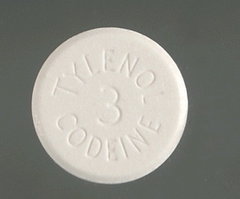 Codeine is an analgesic, antidiarrheal, and antitussive
(anti-cough) opiate. Based on the World Health Organization records, Codeine is
believed to be the most widely used opiate in the world. It is considered to be
one of the most effective oral analgesics used in medicine. However, it is
listed as a controlled substance in some US states and countries, so it is
illegal in those areas to sell, purchase, or even own Codeine.
Codeine is an analgesic, antidiarrheal, and antitussive
(anti-cough) opiate. Based on the World Health Organization records, Codeine is
believed to be the most widely used opiate in the world. It is considered to be
one of the most effective oral analgesics used in medicine. However, it is
listed as a controlled substance in some US states and countries, so it is
illegal in those areas to sell, purchase, or even own Codeine. In veterinary medicine, Codeine is used in the management of
pain caused by dog arthritis, cancer, or surgery. Codeine on its own rarely has
any effects on the body. However, when it enters the body, it is metabolized
into morphine. Morphine’s chemical structure is similar to endorphins,
neurotransmitters, which can create a feeling of well-being.
Giving Your Dog Codeine
Codeine can be bought as fifteen to sixty milligram tablets
or thirty to sixty milligram injections. In areas where Codeine can be legally
purchased, you would still need a vet’s prescription. The standard Codeine
dose in the treatment of dog arthritis pain is around 0.25 to 2.0 milligrams
per kilogram of the dog’s weight, once every six to eight hours.
The use of Codeine should not be abruptly stopped as this
can result in withdrawal symptoms. The proper way is to reduce the dosage
gradually over the treatment period. With this aspect in mind, you need to
follow the instructions of your vet very carefully as we do not want your dog
to become dependent on Codeine.
For security reasons, be very discreet when buying and using
Codeine. Since Codeine can be used for illegal purposes, you might not want to
attract the attention of some questionable people. In addition, make sure to
store the drug safely and securely.
Codeine Safety Issues
There are several safety issues regarding Codeine that dog
owners should know. First, the drug is known to cause constipation, and when
used in the long-term can lead to the development of respiratory depression.
Respiratory depression is a severe form of shallow breathing where the lungs
are not able to expand or contract enough to expel right amounts of carbon
dioxide and inhale the necessary amounts oxygen.
Second, Codeine should not be administered together with
dexamethasone, phenobarbital, rifampin, and anti-depressants.
Lastly, Codeine is not safe for dogs allergic to Codeine or
dogs that have pre-existing heart, respiratory, kidney, or liver disease,
brain tumors or those with a history of head trauma.
